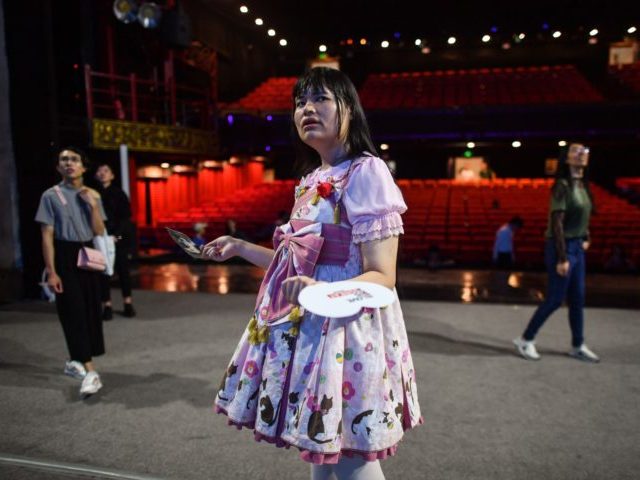China’s state-run Global Times on Thursday announced the opening of the Communist country’s “first multidisciplinary clinic for transgender children and adolescents” at the Children’s Hospital of Fudan University in Shanghai.
The Global Times was a bit vague on exactly when the transgender clinic opened for business, saying only that it opened “recently” after the Shanghai hospital encountered an unspecified number of transgenderism cases in its “clinical practice.”
In one of those cases, an adolescent girl reported suffering “repeated anxiety and depression” upon reaching puberty and expressing a desire to transition to male. Her parents reportedly “tried to dismiss the concept as being in her mind, but their efforts eventually turned out to be in vain.”
“The medical advice given by the psychological doctors and endocrinologists at the hospital was to stabilize and improve her mood first and suppress her menstruation with medication to ease her anxiety. It is up to herself whether she wants surgery when she grows up,” the Global Times reported.
Medical and political acceptance of transgenderism is a very recent phenomenon in China, which would explain why most of the Global Times article is devoted to commentary and statistics on transgenderism in the United States.
In May 2019, Amnesty International (AI) found “prevalent discrimination and stigma” against transgender people in China, including from their own parents.
The AI report warned that Chinese transgender people were “performing highly dangerous surgery on themselves” and “buying unsafe hormone treatments on the black market” because few medical resources were available to them.
“In China, transgender people are classed as having a ‘mental illness’ and gender-affirming surgeries require the consent of families. This is a major barrier in accessing safe treatment. Due to the fear of rejection, many transgender people choose not to tell their families,” AI wrote.
The first person in China to openly undergo gender-changing surgery is 53-year-old TV host Jin Xing, a biological male who became “China’s Oprah Winfrey” after undergoing transition surgery in 1995.
The New York Times noted in July 2021 that Jin remains one of the few major gay or transgender celebrities in China. Jin’s career success could be partly due to the persona of a conservative traditionalist who has “hounded female guests to hurry up and get married” and have children, and encouraged women to attract a man by acting like “a little girl who needs him.”
These are messages the Chinese Communist Party wants to spread as it fights against a low-birth demographic death spiral, but apparently the Party lost interest in Jin Xing as a spokeswoman in 2017 when Jin’s popular TV show was suddenly canceled for reasons that have never been explained.
The NYT quoted observers who thought the cancellation of Jin’s show marked the beginning of a “broader government crackdown on gender-related activism,” but after four years that crackdown might be ending as quickly and mysteriously as it began.
Last month, Nikkei Asia profiled Huang Xi, a transgender lawyer, activist, and counselor who was born male but came out in 2017 after attending school in the United States and taking some inspiration from the career of Jin Xing.
Huang noted China still lacks any legal classification for trans people and surgery is still very difficult to obtain. Parents are known to commit transgender children to involuntary psychiatric care when they come out.
The Chinese government continues to make no effort to count or estimate the size of its transgender population, although academic researchers have estimated a transgender rate of 0.28 percent, which would be about 4 million people given China’s immense general population.
“It’s necessary to resolve their traumatic experiences first before they can make decisions on their own about what’s next,” Huang said of the work performed by Huang’s foundation, the Trans Well-Being Team, which conducts most of its activities online.
The opening of a transgender clinic in Shanghai, with approving coverage from Chinese state media, will surely be welcomed as a positive step by transgender Chinese. Another unexpected good omen arrived three weeks ago, when Jin Xing announced the return of the canceled talk show at a press conference also held in Shanghai.
“When the show was canceled, I said to myself that I needed to lay low and learn more. When the right moment came, I would then be able to talk about even more standout things that show my attitude,” Jin said at the press conference.
According to the Global Times, the reaction of Chinese “netizens” was mostly positive, and their hyper-censorious government allowed them to be positive. The only skepticism reported by the Global Times came from social media commenters who thought Jin was “sometimes too radical.”
“Insiders believe that the return of the show isn’t significant for its ‘radical’ language, but more importantly because it shows the high tolerance the Chinese general public has toward the transgender community,” the Global Times wrote. That high level of tolerance was considerably more difficult to detect just a few months ago.

COMMENTS
Please let us know if you're having issues with commenting.